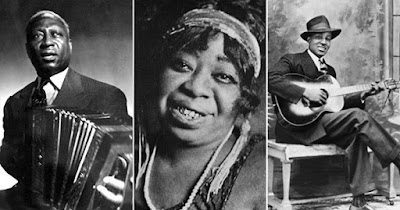Striking a Chord: The History of Blues Music
The musical genre of the blues has been around for as long as any of us can remember, but - like anything else - it has its roots. The history of the blues traces back over a century and a half to post-Civil War America, originating with freed slaves. Though slavery was abolished in 1865, Americans in the Deep South still found ways to obtain free labor. Free Black men were placed in prison farms, which served as inspiration for many blues songs. Jim Crow laws continued to incite violence against African Americans; as they had for centuries, Black musicians told the stories of their pain through song.
Charley Patton, born in 1891, was one of the first men credited as a founder of the blues. Patton was regularly commissioned to perform at picnics and parties and recorded 57 songs throughout his life. W.C. Handy, however, solidified the style by pioneering the 12-bar style of music that is still used as a guideline for blues artists today. Handy performed hits such as “Saint Louis Blues,” “The Memphis Blues,” and “Yellow Dog Blues.”
1916 marked the beginning of the Great Migration, which, over the course of five decades, saw around six million African Americans move out of the South in an attempt to escape oppression and segregation. Among these travelers were troubadours, who - guitars slung over their shoulders - left in search of musical careers during the 1940s and 50s. Many of these musicians found themselves in Chicago, performing on streets and in clubs. Blues music began to grow in popularity, influencing artists such as Elvis Presley and Bob Dylan. The music of famed rhythm and blues artist Chuck Berry, in particular, played a huge role in the Beatles’ career. The rest, as they say, is history.
The blues have made a large impact on music as we know it today. Its singers are poets with a deep understanding of emotions and the ability to put them in words or a melody. The blues has a story to tell, one of profound mistreatment and the freedom that followed, and that story continues today. There’s a history in the music notes, and there’s a future - our future.
Trending

The First Americans Were Black Indians of African Descent
November 20, 2019

The Potato Chip Was Invented by a Black Man Named George Crum
November 21, 2019

Martin Luther King, Jr. Was Arrested 29 Times For These So-Called Crimes
November 03, 2019

Meet the Black Inventor Who Created the First Digital Cell Phone
November 06, 2019

Who Was Jim Crow? Was He a Real Person?
January 26, 2020
Most Popular Posts:
You May Also Like:

The First Americans Were Black Indians of African Descent
November 20, 2019

Martin Luther King, Jr. Was Arrested 29 Times For These So-Called Crimes
November 03, 2019
Also Check Out:

The First Americans Were Black Indians of African Descent
November 20, 2019

The Potato Chip Was Invented by a Black Man Named George Crum
November 21, 2019











